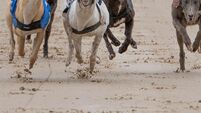Is Government funding for animal welfare money well spent?

Will 2022 be the year that the Irish Government finally decides that greyhound racing should no longer be a subsidised part of our culture?
In what has become an annual pre-Christmas tradition, Agriculture Minister Charlie McConalogue has announced funding of over €3.7m to 98 animal welfare organisations nationwide.
As a way of cementing this tradition into the long term, December 15 was given the title of the inaugural 'Animal Welfare Awareness Day', as an initiative to raise awareness of animal welfare.
















